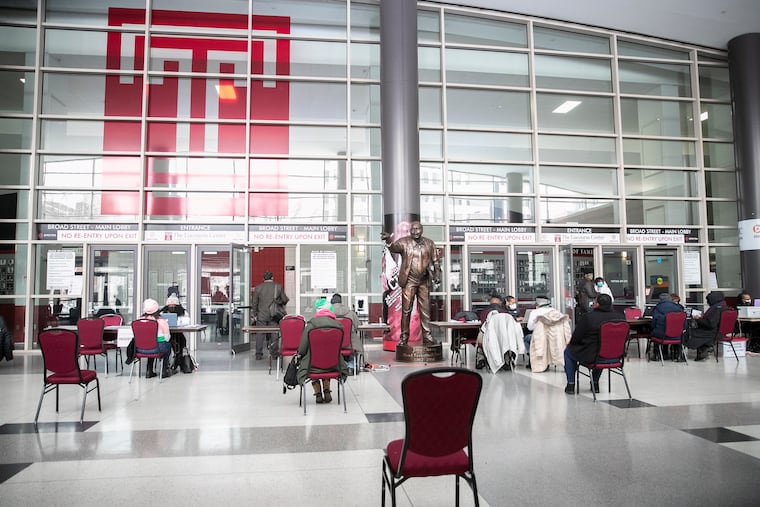At current rate, Philly’s adults won’t all be vaccinated until March 2022, though herd immunity could come a little sooner
”Which means we are going to be living with some risk and have to continue to wear masks for months,” Health Commissioner Thomas Farley said.

As the region and nation grapple with a still-limited supply of vaccine doses, Philadelphia Health Commissioner Thomas Farley said Friday the city’s entire adult population won’t be vaccinated until March 2022 if the city continues receiving doses at the current rate.
About two-thirds of residents will be vaccinated by Oct. 1, and the city could achieve herd immunity by October or November, Farley told a City Council committee Friday afternoon at a hearing on the city’s vaccine distribution and former partnership with Philly Fighting COVID.
”Which means we are going to be living with some risk and have to continue to wear masks for months,” Farley said. “And there are going to be people who are still frustrated because they can’t get vaccines for months.”
The Biden administration has pledged to increase production and supply of the vaccines. For now, supply remains strained. Philadelphia, which receives and distributes vaccine independently from the state, has been receiving about 20,000 doses a week. In the rest of Pennsylvania, some counties this week received far fewer doses than usual this week.
» READ MORE: Montco, Chesco, and other counties got thousands fewer vaccine doses than expected this week
At a news briefing Friday, a Pennsylvania Department of Health adviser could not say whether counties that are close to running out of new doses would receive a bigger shipment next week or give details about efforts to improve the state’s vaccine rollout.
“We have to distribute as equitably as possible across the state and so unfortunately when we do that, some of the supply goes down in other areas,” senior adviser Lindsey Mauldin said at a news briefing.
Repeating assurances given by Gov. Tom Wolf and his health officials in recent weeks, Mauldin said the commonwealth is still working on improving the rollout on its end — including by possibly creating a centralized vaccine registration system, communicating better with vaccine providers, or creating mass vaccine sites — but did not provide specifics or a timeline for next steps.
Among counties that received fewer doses than expected were Allegheny and Montgomery, the two most populous counties that get allotments from the state, The Inquirer reported Thursday.
» READ MORE: Where can I get a COVID-19 vaccine in the Philly area? Use our lookup tool.
The Department of Health said the supply was spread more thinly because more and more providers are requesting doses, but Mauldin could not say whether the state had considered turning new providers away until supply increases.
“We are again just looking to see what happens with all the supply coming in and we’ll continue to think that through,” she said.
Vaccination game
Asked about Pennsylvania’s low-ranking percentage of people vaccinated compared to other states and whether the commonwealth could use other states’ strategies, Mauldin said the department was satisfied that 84% of first doses received by the state have been given out.
“I think that’s an important number to stay focused on,” she said, “and that’s what we’re focused on at the department.”
But counting all doses allocated to the state and the total given as first and second shots, only about 55% of the state’s total allotment will have been administered by Saturday, according to health department estimates.
As of Friday morning, 1,164,600 doses of the vaccine had been given to 918,210 people in Pennsylvania, and of those, 246,390 people had received both doses. About 64% of residents and staff at nursing homes have also been vaccinated, Maudlin said.
Pennsylvania on Friday reported 4,688 newly confirmed virus cases, with new daily cases appearing to have plateaued. The state reported 138 deaths and declining hospitalizations.
» READ MORE: Philly teachers union president tells members not to go to school Monday, setting up a showdown
In Philadelphia, 112,464 first doses plus 44,590 second doses had been administered as of Friday afternoon. Farley said many of the city’s shots are going to people who work in the city but live in surrounding counties — who qualify because they are among Philadelphia’s essential workers — but that decreases the number of doses per capita available for the city’s population.
While the city works on getting rotating clinics up and running to vaccinate 500 people a day, Farley said he hopes hospitals will soon open their own 500-a-day sites and that other organizations would eventually be able to do the same.
“If it works well, looking months out, we’ll have many organizations running many opportunities like that,” he said. “It will be a patchwork of many organizations.”
Stay home for the Super Bowl
New Jersey has given out about 62% of its doses, according to state data. By Friday, the state had administered about 950,000 vaccines, which Gov. Phil Murphy said was a sign that its rollout is picking up speed. The number of initial doses in arms has increased by 22% since last week, Murphy said, and the number of second doses administered — almost 180,000 — has tripled in recent weeks.
“This is clearly forward progress being made against intense scarcity,” he said. “It’s not perfect by any means, we need more supply. But the rate of growth is encouraging.”
The state added 3,723 cases and 93 deaths. Hospitalizations are continuing to trend downward as they have in recent weeks.
» READ MORE: When your chance for a COVID-19 shot comes, experts say don’t worry about the numbers
With Super Bowl Sunday two days away, Murphy asked residents not to host or attend large indoor parties.
“This isn’t the year for a massive Super Bowl blowout,” he said. “Let’s get through this weekend and keep pushing our numbers down.”